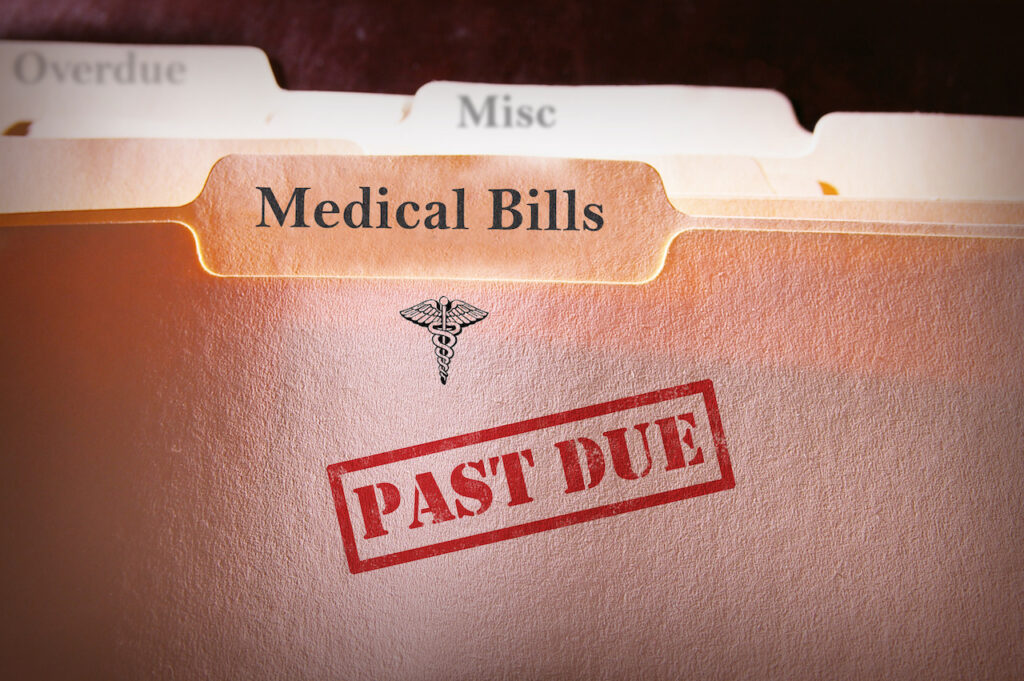Credit Sesame discusses the proposed CFBP rule on medical debt and whether it can ever come to fruition.
The Consumer Financial Protection Bureau (CFPB) has approved a rule banning reporting agencies from including medical debt on credit reports. As a result, that debt would no longer directly affect people’s credit scores.
A natural reflex might be to applaud the CFPB’s decision. Nobody likes medical debt, and penalizing people for debt forced on them by unforeseen circumstances, such as a medical emergency, may seem unfair.
However, a closer look suggests that the CFPB’s action may not be the right cure for medical debt. At best, it could be like a medicine that eases a symptom without addressing the underlying illness. At worst, it may prove to be a well-intentioned empty gesture.
What the CFPB rule on medical debt means
By removing medical debt from credit reports and scores, the CFPB hopes to prevent debt collectors from using the threat of damaged credit to coerce consumers into paying. Damage to credit scores can be especially unfair when miscommunication among medical institutions and insurance companies has caused that debt to be reported inaccurately.
According to the CFPB, the new rule will remove $49 billion in medical bills from the credit reports of about 15 million Americans. They estimate that people with medical debt on their credit reports could see their credit scores rise by an average of 20 points.
The issue is that the CFPB does not have a magic wand. It cannot make medical debt disappear. It can be erased from credit reports, but consumers will still owe that debt. As with an illness, ignoring that reality may make the situation worse.
Treating the symptom, not the cause
The appearance of medical debt on a credit report is just a symptom of the problem. The debt itself is the actual problem. Underlying that, inadequate insurance and the high cost of healthcare are the causes of that problem.
As the CFPB claims, removing medical debt from credit reports might give consumers a quick 20-point bump in their credit scores. However, it does not remove the obligation to pay that debt. Creditors can still sue for payment. In turn, paying that debt may impair a consumer’s ability to pay other bills, which could reverse the short-term boost to their credit scores.
The new rule may face hurdles
Besides being an inadequate solution to the problem of medical debt, the new rule may not survive very long.
The CFPB has recently taken several activist positions. They are trying to get things done before a new administration that is more sympathetic to the financial sector comes to power. However, the problem with changing things through rule-making rather than legislation is that a new administration can easily change those rules.
Also, rules wiping medical debt off credit reports may face legal challenges. After all, they require lenders to make decisions based on incomplete information about potential borrowers’ financial condition. If the new administration replaces the advocates for those rules on the CFPB’s staff, the agency may find it difficult to defend those rules in court.
How the new rule could backfire for consumers
Even if the new rule survives, it may not be good for consumers.
Lenders are bound to respond if the rule artificially raises credit scores by excluding certain negative information. They may raise their lending standards to compensate for that boost in credit scores. The result may be that credit would become more difficult to obtain.
Even for specific borrowers with medical debt, the rule might not help them in the long run. If they are approved for a loan they cannot repay because of their medical debt, it will ultimately hurt their financial situation and credit scores. It would be better to acknowledge the reality of their existing debt obligations in any lending decisions.
Consequences of the CFBP rule on medical debt
The rule removing medical debt from credit reports isn’t a perfect solution. While it can temporarily boost credit scores for those with medical debt, the long-term benefits may be limited. As the rule improves the credit scores of individuals with medical debt, others without such debt may feel pressure to take additional steps to raise their scores to stay competitive. This dynamic creates a scenario where the overall credit landscape adjusts, potentially offsetting the initial advantages.
With or without medical debt, there are some more permanent moves you can make to raise your credit score:
- Keep balances down. Always try to make more than the minimum payment on your credit card bills.
- Stay on schedule. Payment history is the number one factor affecting credit scores, so try to keep your payments on time.
- Know where you stand. Signing up with Credit Sesame lets you stay informed of changes in your credit score. It can also provide you with timely tips about what you could do to raise your score.
- Limit applications for new credit. Pick your spots. That way, new credit accounts and inquiries won’t keep dinging your credit score.
The new medical debt rule brings opportunities and uncertainties, leaving many questions unanswered. To navigate this shifting landscape, focus on proactive steps to strengthen your credit score. Maintaining good financial habits can build resilience and ensure your credit profile stays strong—no matter how the rules evolve.
If you enjoyed CFPB rule on medical debt may be an empty gesture you may like,
Disclaimer: The article and information provided here are for informational purposes only and are not intended as a substitute for professional advice.
Read the full article here
















